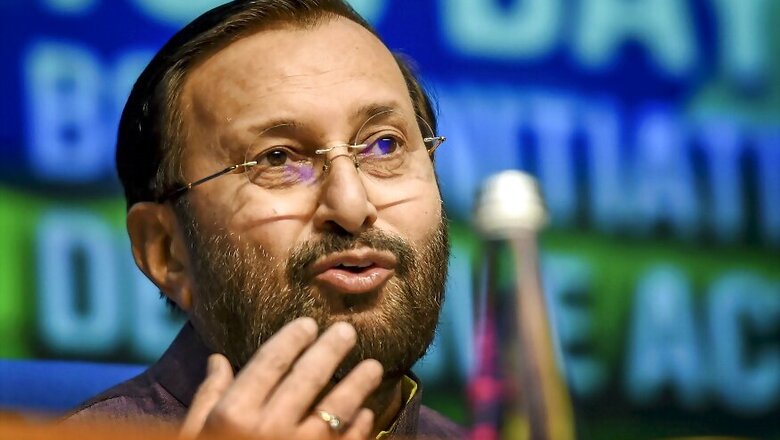
views
Union Environment minister Prakash Javadekar on Tuesday urged developed countries to do their part by extending financial and technological support to developing nations as envisaged under the UN convention on climate change and its Paris agreement.
"The promise of USD 1 trillion by 2020 has not been fulfilled so far, and I hope that in the remaining five months of 2020, the promised amount is mobilized and delivered for further strengthening climate actions in developing countries," he said at the fourth edition of the virtual Ministerial on Climate Action.
Javadekar called upon developed countries to do their part as envisaged under the United Nations Framework Convention on Climate Change (UNFCCC) and its Paris Agreement, for extending financial and technological support to developing countries.
The virtual meet saw countries exchanging views on how they are aligning economic recovery plans with the Paris Agreement and the critical enabling conditions to ensure continued climate action.
The meeting was co-chaired by European Union, China and Canada to advance discussions on the full implementation of the Paris Agreement under the UNFCCC) and to demonstrate continued political commitment to global climate action.
Representing India, Javadekar said the country has taken very significant steps to combat climate change and will continue its efforts in the future as well.
Highlighting India's efforts, the minister said India has achieved reduction of 21 per cent in emission intensity of its GDP between 2005 and 2014, thereby achieving its pre-2020 voluntary target.
"Further, India's renewable energy installed capacity has increased in last 5 years and stands at more than 87 Gigawatt.
"The share of non-fossil sources in installed capacity of electricity generation increased from 30.5 per cent in March 2015 to 37.7 per cent in May 2020 and our Prime Minister has further announced the aspirational target of increasing our renewable energy capacity to 450 GW," Javadekar said.
The minister further said India has provided 80 million LPG connections in rural areas, providing them with clean cooking fuel and healthy environment.
"India's total forest and tree cover is 8,07,276 sq. km which is 24.56 per cent of the total geographical area of the country.
"More than 360 million LED bulbs have been distributed under UJALA scheme, which has led to energy saving of about 47 billion units of electricity per year and reduction of 38 million tonnes of CO2 per year," he told the participating countries.
The minister also highlighted how India had levied a coal cess of Rs 400 as part of one of the most explicit green initiatives which is now subsumed under Goods and Services Tax (GST).
The fourth edition of the meeting was attended by Ministers and representatives of about 30 countries and was held virtually for the first time in view of the ongoing COVID-19 pandemic, a ministry official said, adding that the purpose was to ensure that progress is made on climate action.
Even in December last year at the UN COP 25 held in Madrid, India had asked the developed world to fulfil its commitment to provide USD 1 trillion in public finance and collaborate on technology, which is crucial for developing nations to fight climate change, with the environment minister stressing that the world which benefited from carbon emissions that made them developed, must repay.



















Comments
0 comment